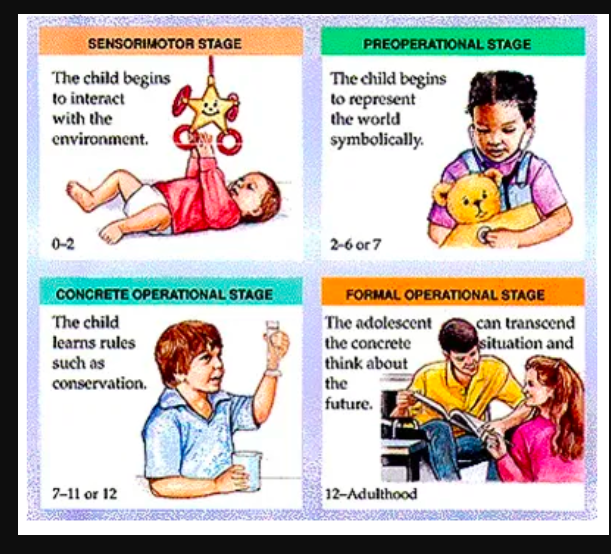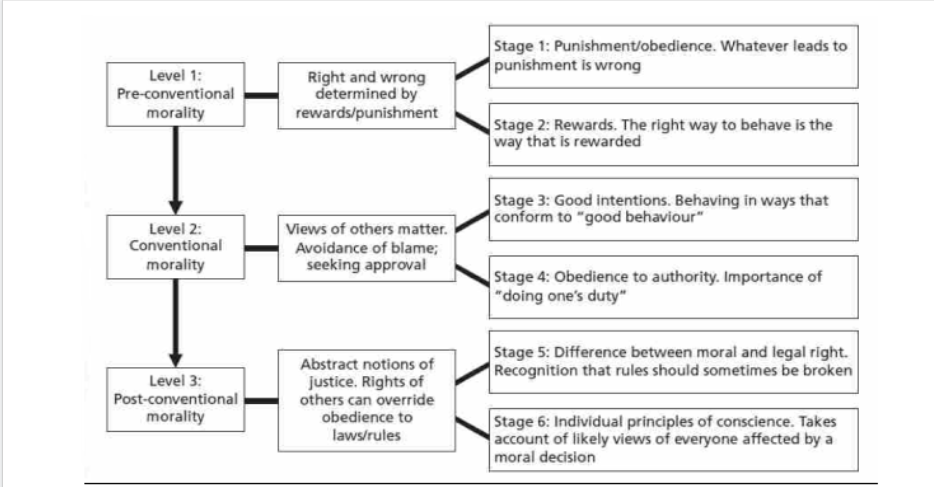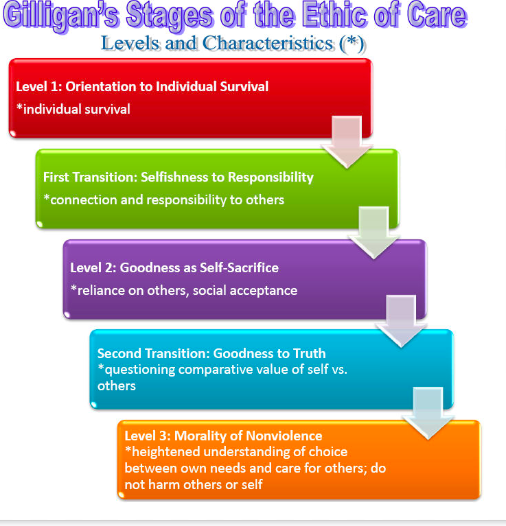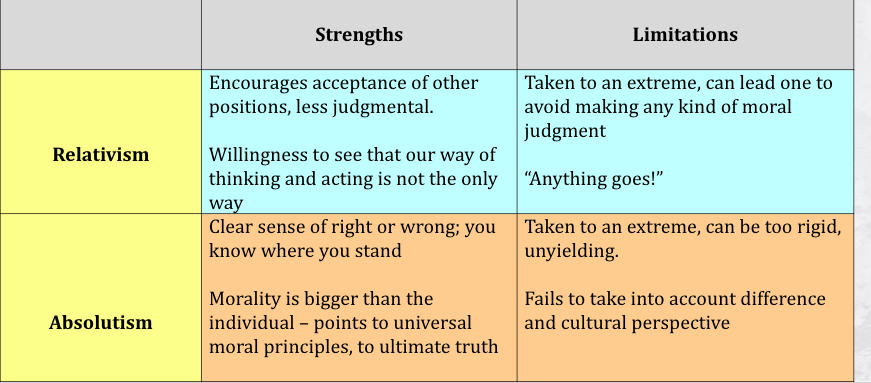Morality Unit 3
0.0(0)
Card Sorting
1/39
Earn XP
Description and Tags
Last updated 8:54 PM on 2/3/26
Name | Mastery | Learn | Test | Matching | Spaced | Call with Kai |
|---|
No analytics yet
Send a link to your students to track their progress
40 Terms
1
New cards
Piaget’s Theory of Cognitive Development
More of a child’s brain development

2
New cards
Kohlberg’s six stages of moral development
A moral way to look at it
May not reach all stages
6 stages
May not reach all stages
6 stages

3
New cards
Carol Gilligan’s Theory of Moral Development
3 full stages
\
\

4
New cards
Subjective Morality
* **Relativism**
* an individual or culture determines an action to be right or wrong.
* an individual or culture determines an action to be right or wrong.
5
New cards
Objective Morality
* **Absolutism**
* There is one moral code “out there” in the universe regardless of our opinion.
* Right and wrong are bigger than personal/collective opinions.
* There is one moral code “out there” in the universe regardless of our opinion.
* Right and wrong are bigger than personal/collective opinions.
6
New cards
Pros and cons of Relativism and Absolutism

7
New cards
Human Act
A purposeful act by a person with the original intentions being carried out
Involves Freedom, Intention, and Knowledge
Involves Freedom, Intention, and Knowledge
8
New cards
Act of a human
An act that was carried out by accident, not following the original intensions.
9
New cards
Freedom for/Freedom from
A choice we pursue that one is free when one can choose between good and evil. (Freedom from constraints)
\
for is to do something
from is to avoid
\
for is to do something
from is to avoid
10
New cards
Intention
An orginal plan or goal
11
New cards
Head knowledge/Heart knowledge
A person is aware of the rightness or wrongness of what he is about to do and brings knowledge to his actions. Either relating to common sense or emotional sense.
12
New cards
Self-determination
Freedoms influence who we become; pursuit of existence
13
New cards
Goal of morality as human flourishing
* To live intentionally
14
New cards
How to anzlyaze a moral act
Think about:
* Freedom, Intention, Knowledge
* Means
* Consequences
* Freedom, Intention, Knowledge
* Means
* Consequences
15
New cards
Values
Whatever we subjectively judge worth having (e.g. work, inner peace, money), doing (e.g. helping others, gardening, social action), or being (healthy, happy, successful).
16
New cards
Virtues
A lived moral value; a manifest moral quality of a person (e.g. patience, prudence, kindness, courage).
\
**Our virtues are based in our values; they are the lived examples of what we find important.**
\
**Our virtues are based in our values; they are the lived examples of what we find important.**
17
New cards
Aristotle’s “Golden Mean” of Virtue
* **for Aristotle, a virtue is a mean between two vices**
* Cowardness (too little fear)
* Courage (virtue)
* Recklesness (To much fear)
* Cowardness (too little fear)
* Courage (virtue)
* Recklesness (To much fear)

18
New cards
Thomas Aquinas
Held the concept of Natural Law
19
New cards
What is the overriding principle of Natural Law
Do good and avoid evil
20
New cards
Four primary principles of natural law
* To preserve life
* To marry, to have & educate kids
* To search for the truth
* To live in society
* To marry, to have & educate kids
* To search for the truth
* To live in society
21
New cards
What are the two understandings of natural law
1. *Moral Order in the Universe*
*2. Human Inclination to know/do the good*
\n
22
New cards
Reason/Nature
Since human persons are RATIONAL creatures, it is good for them to act in accord with their reason
23
New cards
Ontology
**what something is made of/to be naturally**
24
New cards
teleology
**what something is meant for/what purpose something serves**
25
New cards
Natural law and ontology and teleology
***Ontologically*** **we are made in the image and likeness of God with reason.**
\n ***Teleologically*** **we are made to use this reason to be in right relationship with God (“Do Good and Avoid Evil”).**
\n ***Teleologically*** **we are made to use this reason to be in right relationship with God (“Do Good and Avoid Evil”).**
26
New cards
What is natural law
* Not really “law” in the usual sense
* Turning to nature
* In the Scriptures, God’s law “written into our hearts”
* Discerning moral order in the universe and in ourselves as made in the image of God
* Accessed through **use of reason**
* Turning to nature
* In the Scriptures, God’s law “written into our hearts”
* Discerning moral order in the universe and in ourselves as made in the image of God
* Accessed through **use of reason**
27
New cards
Plato’s Ring
**Let’s say you have a ring. When you put on this ring, you become completely invisible. You can do whatever you want and no longer have to face the consequences of your actions, yay!**
\
**Plato says everyone would be self-centered with this ring.**
\
\
\
**Plato says everyone would be self-centered with this ring.**
\
\
28
New cards
Six major ethical approaches:
* Christian Ethics
* Virtue Ethics
* Utilitarian Ethics
* Deontological Ethics
* Common Good Ethics
* Libertarian Ethics
* Virtue Ethics
* Utilitarian Ethics
* Deontological Ethics
* Common Good Ethics
* Libertarian Ethics
29
New cards
Christian Ethics
Following christian values
30
New cards
Virtue Ethics
Never making a bad decision
Just being good.
Just being good.
31
New cards
Utilitarian Ethics
Pleasure - Pain = happiness
32
New cards
Deontological Ethics
Doing what is best for society
33
New cards
Common Good Ethics
Serve the people
Whats best for soicety
Veil of ignornace
Whats best for soicety
Veil of ignornace
34
New cards
Libertarian Ethics
* All about freedom
* Limiting influence of goverment
* the rights to be respected are NONINTERFERENCE rights. These generally fall under the heading of rights to life, to liberty or to property.
* Limiting influence of goverment
* the rights to be respected are NONINTERFERENCE rights. These generally fall under the heading of rights to life, to liberty or to property.
35
New cards
The Three Theological Virtues
* Faith
* Hope
* Love
**The Theological Virtues are gifts from God, and, through our cultivation of these gifts, they perfect our humanity.**
* Hope
* Love
**The Theological Virtues are gifts from God, and, through our cultivation of these gifts, they perfect our humanity.**
36
New cards
Fatih (Theological Virtue)
**Faith is the “eyes of being in love with God”. It is an ultimate trust in one’s own belovedness, which orients our entire selves towards God.**
37
New cards
Hope (Theological Virtue)
**Hope is the love of the future. It is not to be confused with optimism, which often results in toxic positivity. Hope is a love of something which is always just a little bit not yet.**
38
New cards
Love (Theological Virtue)
**Love, also known as “Caritas” (Charity) or “Agape”. A love which seeks nothing in return, a total giving of one’s self to the other.**
39
New cards
Purpose of Beatitudes:
**the signs of what it means to be a good human being, an ethical government, a moral country.**
40
New cards
The Beatitudes
Blessed are those who mourn \n \n Happy are those who thirst for righteousness \n \n Blessed are the merciful \n \n Blessed are the meek \n \n Blessed are the poor in spirit